Organizational Behaviour Report: Leadership, Motivation, and Tesco
VerifiedAdded on 2019/12/03
|14
|4276
|169
Report
AI Summary
This report provides a comprehensive analysis of organizational behaviour, exploring various leadership theories, including behavioral, great man, and trait theories, and their impact on organizational effectiveness. It evaluates different managerial styles, such as Likert's styles, and their influence on employee motivation and organizational outcomes. The report also examines motivational theories like Maslow's hierarchy of needs and Herzberg's two-factor theory, highlighting their role in enhancing employee engagement. Furthermore, it delves into theories depicting working relationships and interactions, such as social exchange and uncertainty reduction theories. The report also discusses how organizations can foster innovation and creativity, emphasizing the importance of learning cultures and effective teamwork. Finally, it analyzes the culture and structure of Tesco, exploring its decision-making processes and approaches to managing risk and uncertainty. The report concludes with an assessment of the effectiveness of organizational decisions within Tesco.
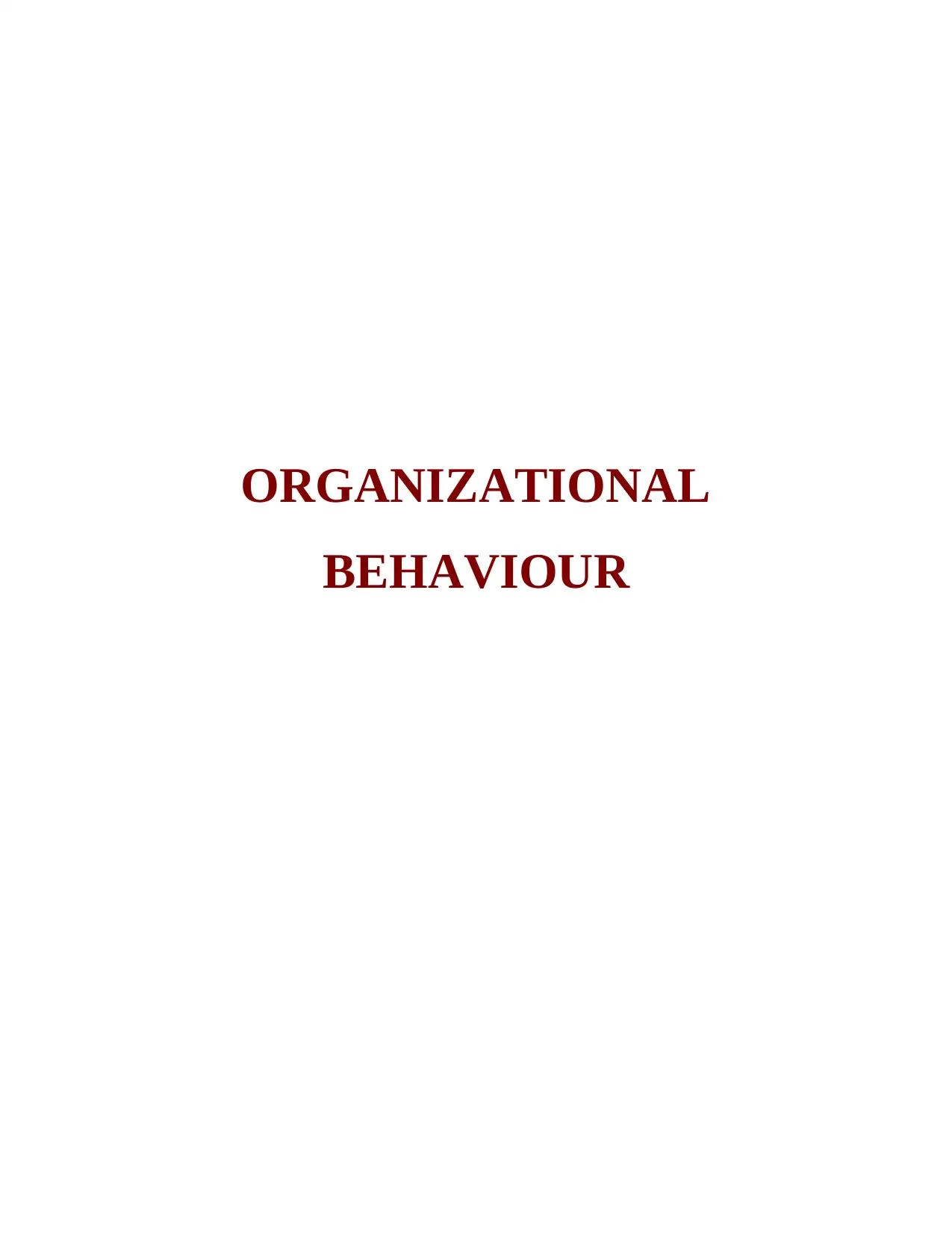
ORGANIZATIONAL
BEHAVIOUR
BEHAVIOUR
Paraphrase This Document
Need a fresh take? Get an instant paraphrase of this document with our AI Paraphraser
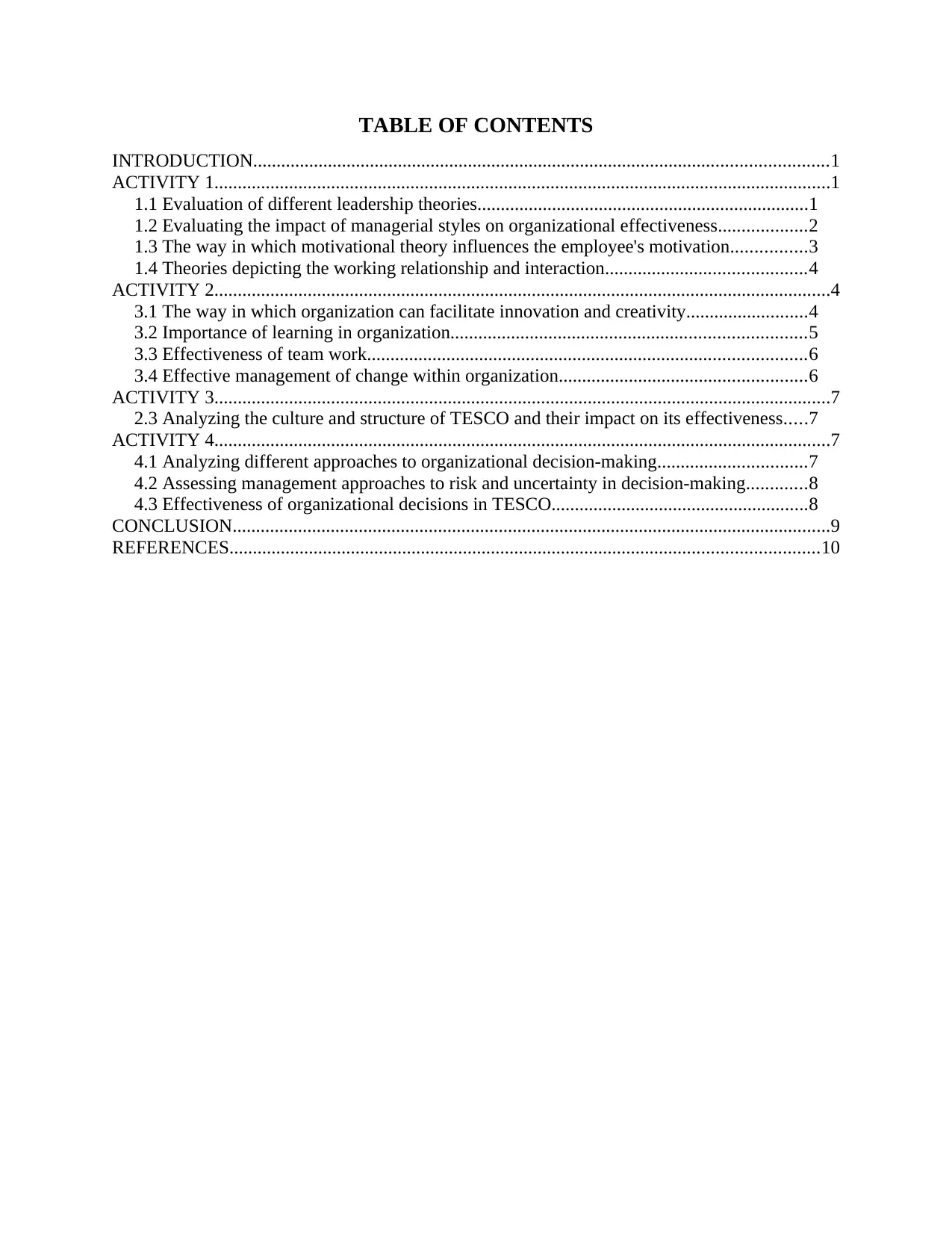
TABLE OF CONTENTS
INTRODUCTION...........................................................................................................................1
ACTIVITY 1....................................................................................................................................1
1.1 Evaluation of different leadership theories.......................................................................1
1.2 Evaluating the impact of managerial styles on organizational effectiveness...................2
1.3 The way in which motivational theory influences the employee's motivation................3
1.4 Theories depicting the working relationship and interaction...........................................4
ACTIVITY 2....................................................................................................................................4
3.1 The way in which organization can facilitate innovation and creativity..........................4
3.2 Importance of learning in organization............................................................................5
3.3 Effectiveness of team work..............................................................................................6
3.4 Effective management of change within organization.....................................................6
ACTIVITY 3....................................................................................................................................7
2.3 Analyzing the culture and structure of TESCO and their impact on its effectiveness.....7
ACTIVITY 4....................................................................................................................................7
4.1 Analyzing different approaches to organizational decision-making................................7
4.2 Assessing management approaches to risk and uncertainty in decision-making.............8
4.3 Effectiveness of organizational decisions in TESCO.......................................................8
CONCLUSION................................................................................................................................9
REFERENCES..............................................................................................................................10
INTRODUCTION...........................................................................................................................1
ACTIVITY 1....................................................................................................................................1
1.1 Evaluation of different leadership theories.......................................................................1
1.2 Evaluating the impact of managerial styles on organizational effectiveness...................2
1.3 The way in which motivational theory influences the employee's motivation................3
1.4 Theories depicting the working relationship and interaction...........................................4
ACTIVITY 2....................................................................................................................................4
3.1 The way in which organization can facilitate innovation and creativity..........................4
3.2 Importance of learning in organization............................................................................5
3.3 Effectiveness of team work..............................................................................................6
3.4 Effective management of change within organization.....................................................6
ACTIVITY 3....................................................................................................................................7
2.3 Analyzing the culture and structure of TESCO and their impact on its effectiveness.....7
ACTIVITY 4....................................................................................................................................7
4.1 Analyzing different approaches to organizational decision-making................................7
4.2 Assessing management approaches to risk and uncertainty in decision-making.............8
4.3 Effectiveness of organizational decisions in TESCO.......................................................8
CONCLUSION................................................................................................................................9
REFERENCES..............................................................................................................................10
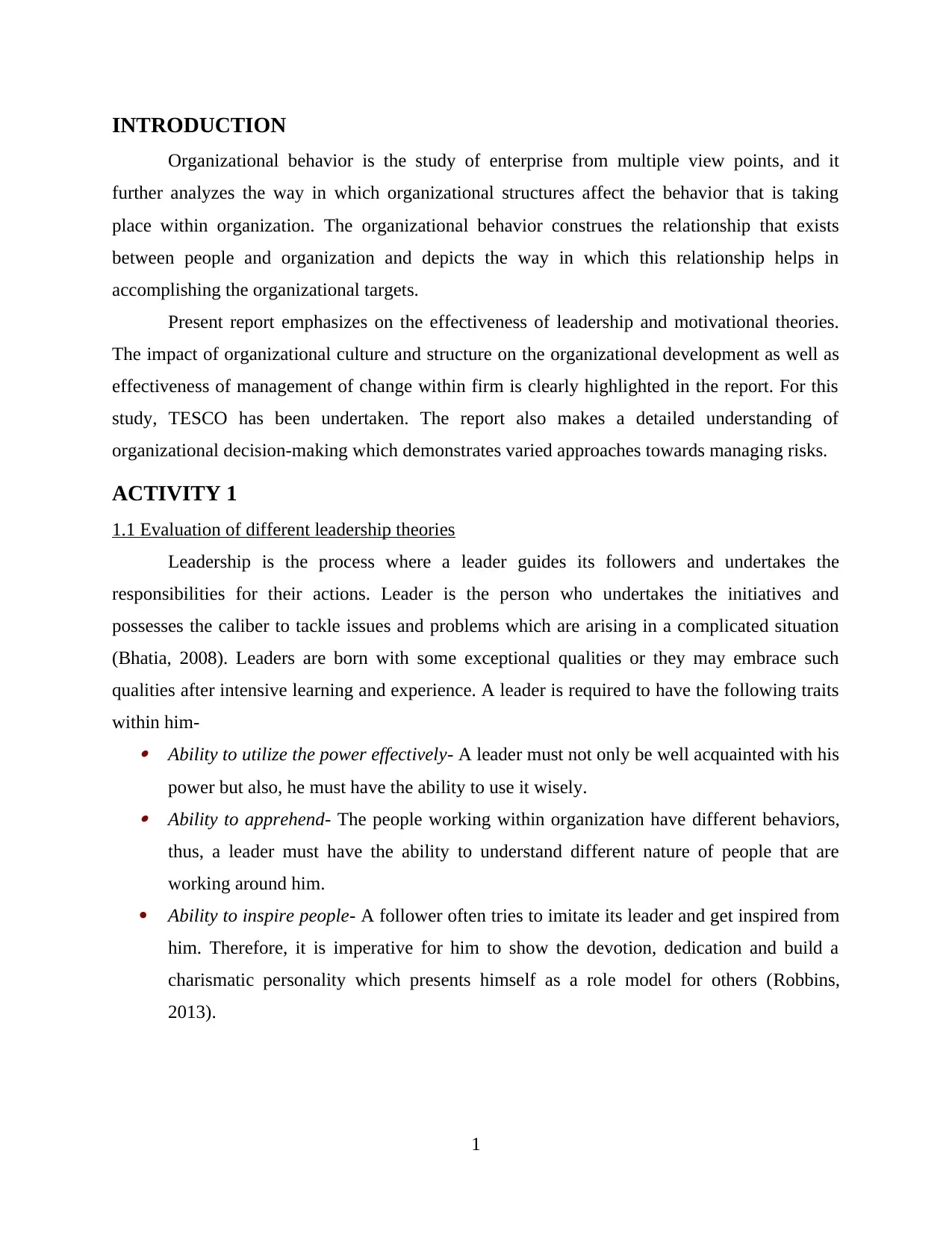
INTRODUCTION
Organizational behavior is the study of enterprise from multiple view points, and it
further analyzes the way in which organizational structures affect the behavior that is taking
place within organization. The organizational behavior construes the relationship that exists
between people and organization and depicts the way in which this relationship helps in
accomplishing the organizational targets.
Present report emphasizes on the effectiveness of leadership and motivational theories.
The impact of organizational culture and structure on the organizational development as well as
effectiveness of management of change within firm is clearly highlighted in the report. For this
study, TESCO has been undertaken. The report also makes a detailed understanding of
organizational decision-making which demonstrates varied approaches towards managing risks.
ACTIVITY 1
1.1 Evaluation of different leadership theories
Leadership is the process where a leader guides its followers and undertakes the
responsibilities for their actions. Leader is the person who undertakes the initiatives and
possesses the caliber to tackle issues and problems which are arising in a complicated situation
(Bhatia, 2008). Leaders are born with some exceptional qualities or they may embrace such
qualities after intensive learning and experience. A leader is required to have the following traits
within him- Ability to utilize the power effectively- A leader must not only be well acquainted with his
power but also, he must have the ability to use it wisely. Ability to apprehend- The people working within organization have different behaviors,
thus, a leader must have the ability to understand different nature of people that are
working around him.
Ability to inspire people- A follower often tries to imitate its leader and get inspired from
him. Therefore, it is imperative for him to show the devotion, dedication and build a
charismatic personality which presents himself as a role model for others (Robbins,
2013).
1
Organizational behavior is the study of enterprise from multiple view points, and it
further analyzes the way in which organizational structures affect the behavior that is taking
place within organization. The organizational behavior construes the relationship that exists
between people and organization and depicts the way in which this relationship helps in
accomplishing the organizational targets.
Present report emphasizes on the effectiveness of leadership and motivational theories.
The impact of organizational culture and structure on the organizational development as well as
effectiveness of management of change within firm is clearly highlighted in the report. For this
study, TESCO has been undertaken. The report also makes a detailed understanding of
organizational decision-making which demonstrates varied approaches towards managing risks.
ACTIVITY 1
1.1 Evaluation of different leadership theories
Leadership is the process where a leader guides its followers and undertakes the
responsibilities for their actions. Leader is the person who undertakes the initiatives and
possesses the caliber to tackle issues and problems which are arising in a complicated situation
(Bhatia, 2008). Leaders are born with some exceptional qualities or they may embrace such
qualities after intensive learning and experience. A leader is required to have the following traits
within him- Ability to utilize the power effectively- A leader must not only be well acquainted with his
power but also, he must have the ability to use it wisely. Ability to apprehend- The people working within organization have different behaviors,
thus, a leader must have the ability to understand different nature of people that are
working around him.
Ability to inspire people- A follower often tries to imitate its leader and get inspired from
him. Therefore, it is imperative for him to show the devotion, dedication and build a
charismatic personality which presents himself as a role model for others (Robbins,
2013).
1
⊘ This is a preview!⊘
Do you want full access?
Subscribe today to unlock all pages.

Trusted by 1+ million students worldwide
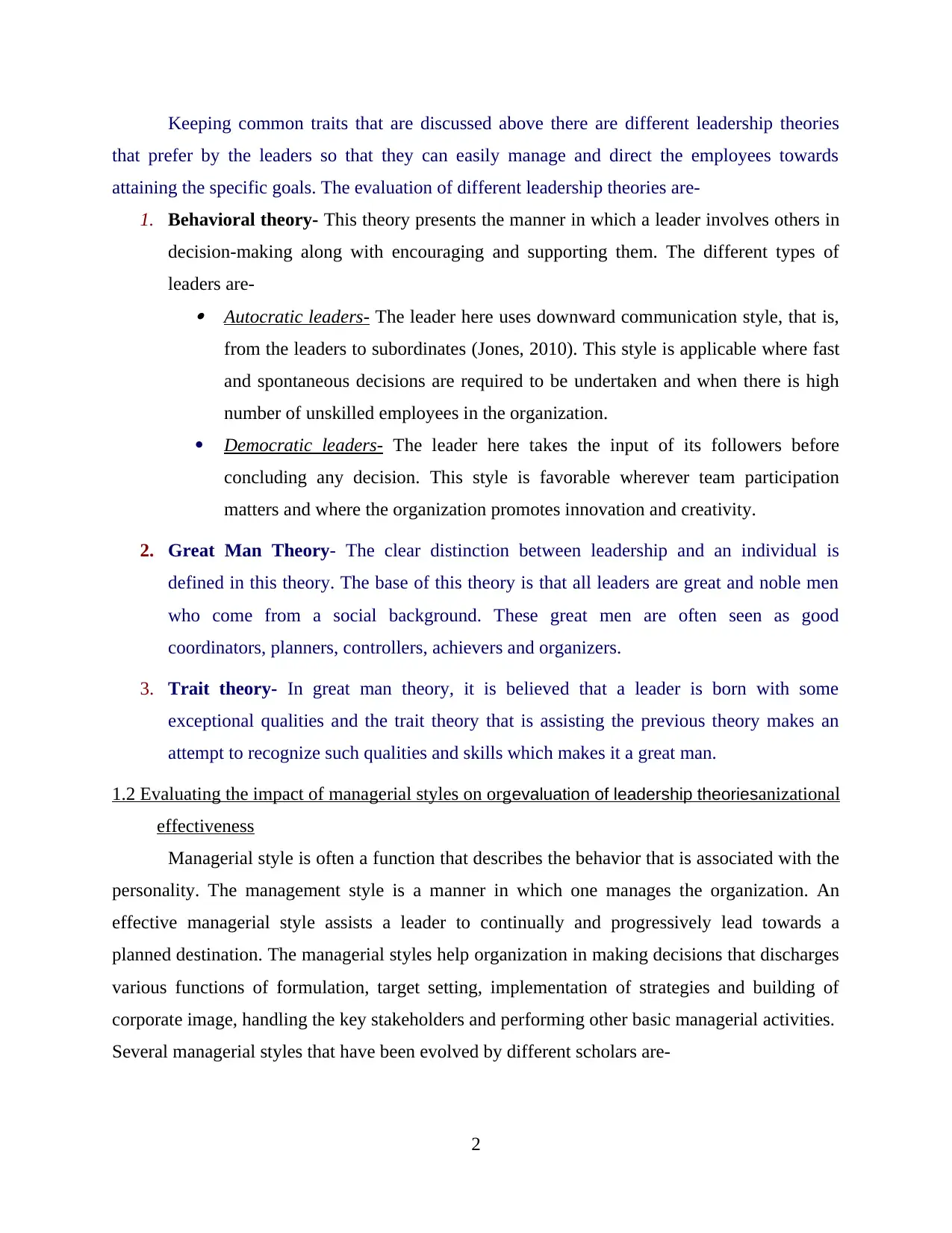
Keeping common traits that are discussed above there are different leadership theories
that prefer by the leaders so that they can easily manage and direct the employees towards
attaining the specific goals. The evaluation of different leadership theories are-
1. Behavioral theory- This theory presents the manner in which a leader involves others in
decision-making along with encouraging and supporting them. The different types of
leaders are-
Autocratic leaders- The leader here uses downward communication style, that is,
from the leaders to subordinates (Jones, 2010). This style is applicable where fast
and spontaneous decisions are required to be undertaken and when there is high
number of unskilled employees in the organization.
Democratic leaders- The leader here takes the input of its followers before
concluding any decision. This style is favorable wherever team participation
matters and where the organization promotes innovation and creativity.
2. Great Man Theory- The clear distinction between leadership and an individual is
defined in this theory. The base of this theory is that all leaders are great and noble men
who come from a social background. These great men are often seen as good
coordinators, planners, controllers, achievers and organizers.
3. Trait theory- In great man theory, it is believed that a leader is born with some
exceptional qualities and the trait theory that is assisting the previous theory makes an
attempt to recognize such qualities and skills which makes it a great man.
1.2 Evaluating the impact of managerial styles on orgevaluation of leadership theoriesanizational
effectiveness
Managerial style is often a function that describes the behavior that is associated with the
personality. The management style is a manner in which one manages the organization. An
effective managerial style assists a leader to continually and progressively lead towards a
planned destination. The managerial styles help organization in making decisions that discharges
various functions of formulation, target setting, implementation of strategies and building of
corporate image, handling the key stakeholders and performing other basic managerial activities.
Several managerial styles that have been evolved by different scholars are-
2
that prefer by the leaders so that they can easily manage and direct the employees towards
attaining the specific goals. The evaluation of different leadership theories are-
1. Behavioral theory- This theory presents the manner in which a leader involves others in
decision-making along with encouraging and supporting them. The different types of
leaders are-
Autocratic leaders- The leader here uses downward communication style, that is,
from the leaders to subordinates (Jones, 2010). This style is applicable where fast
and spontaneous decisions are required to be undertaken and when there is high
number of unskilled employees in the organization.
Democratic leaders- The leader here takes the input of its followers before
concluding any decision. This style is favorable wherever team participation
matters and where the organization promotes innovation and creativity.
2. Great Man Theory- The clear distinction between leadership and an individual is
defined in this theory. The base of this theory is that all leaders are great and noble men
who come from a social background. These great men are often seen as good
coordinators, planners, controllers, achievers and organizers.
3. Trait theory- In great man theory, it is believed that a leader is born with some
exceptional qualities and the trait theory that is assisting the previous theory makes an
attempt to recognize such qualities and skills which makes it a great man.
1.2 Evaluating the impact of managerial styles on orgevaluation of leadership theoriesanizational
effectiveness
Managerial style is often a function that describes the behavior that is associated with the
personality. The management style is a manner in which one manages the organization. An
effective managerial style assists a leader to continually and progressively lead towards a
planned destination. The managerial styles help organization in making decisions that discharges
various functions of formulation, target setting, implementation of strategies and building of
corporate image, handling the key stakeholders and performing other basic managerial activities.
Several managerial styles that have been evolved by different scholars are-
2
Paraphrase This Document
Need a fresh take? Get an instant paraphrase of this document with our AI Paraphraser
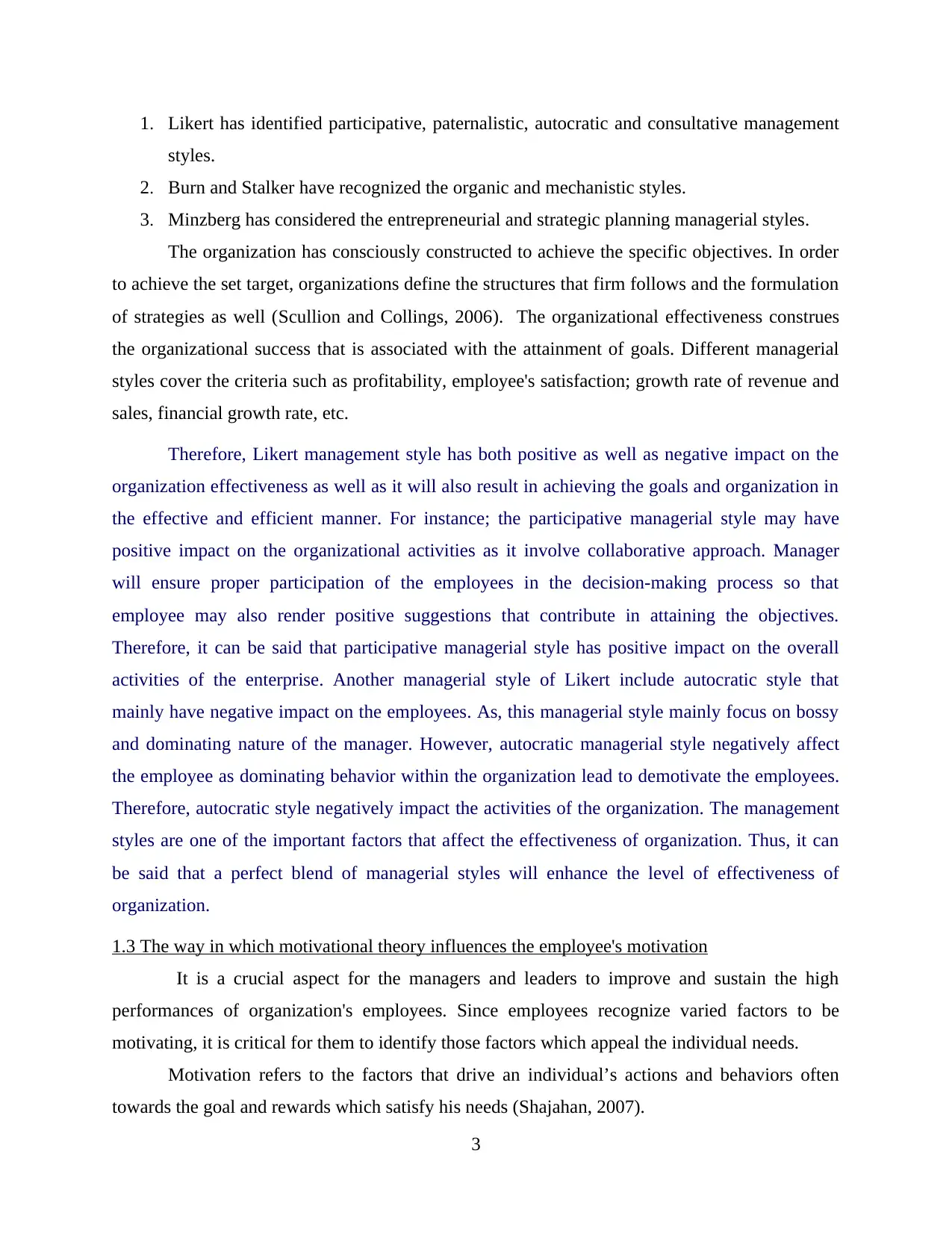
1. Likert has identified participative, paternalistic, autocratic and consultative management
styles.
2. Burn and Stalker have recognized the organic and mechanistic styles.
3. Minzberg has considered the entrepreneurial and strategic planning managerial styles.
The organization has consciously constructed to achieve the specific objectives. In order
to achieve the set target, organizations define the structures that firm follows and the formulation
of strategies as well (Scullion and Collings, 2006). The organizational effectiveness construes
the organizational success that is associated with the attainment of goals. Different managerial
styles cover the criteria such as profitability, employee's satisfaction; growth rate of revenue and
sales, financial growth rate, etc.
Therefore, Likert management style has both positive as well as negative impact on the
organization effectiveness as well as it will also result in achieving the goals and organization in
the effective and efficient manner. For instance; the participative managerial style may have
positive impact on the organizational activities as it involve collaborative approach. Manager
will ensure proper participation of the employees in the decision-making process so that
employee may also render positive suggestions that contribute in attaining the objectives.
Therefore, it can be said that participative managerial style has positive impact on the overall
activities of the enterprise. Another managerial style of Likert include autocratic style that
mainly have negative impact on the employees. As, this managerial style mainly focus on bossy
and dominating nature of the manager. However, autocratic managerial style negatively affect
the employee as dominating behavior within the organization lead to demotivate the employees.
Therefore, autocratic style negatively impact the activities of the organization. The management
styles are one of the important factors that affect the effectiveness of organization. Thus, it can
be said that a perfect blend of managerial styles will enhance the level of effectiveness of
organization.
1.3 The way in which motivational theory influences the employee's motivation
It is a crucial aspect for the managers and leaders to improve and sustain the high
performances of organization's employees. Since employees recognize varied factors to be
motivating, it is critical for them to identify those factors which appeal the individual needs.
Motivation refers to the factors that drive an individual’s actions and behaviors often
towards the goal and rewards which satisfy his needs (Shajahan, 2007).
3
styles.
2. Burn and Stalker have recognized the organic and mechanistic styles.
3. Minzberg has considered the entrepreneurial and strategic planning managerial styles.
The organization has consciously constructed to achieve the specific objectives. In order
to achieve the set target, organizations define the structures that firm follows and the formulation
of strategies as well (Scullion and Collings, 2006). The organizational effectiveness construes
the organizational success that is associated with the attainment of goals. Different managerial
styles cover the criteria such as profitability, employee's satisfaction; growth rate of revenue and
sales, financial growth rate, etc.
Therefore, Likert management style has both positive as well as negative impact on the
organization effectiveness as well as it will also result in achieving the goals and organization in
the effective and efficient manner. For instance; the participative managerial style may have
positive impact on the organizational activities as it involve collaborative approach. Manager
will ensure proper participation of the employees in the decision-making process so that
employee may also render positive suggestions that contribute in attaining the objectives.
Therefore, it can be said that participative managerial style has positive impact on the overall
activities of the enterprise. Another managerial style of Likert include autocratic style that
mainly have negative impact on the employees. As, this managerial style mainly focus on bossy
and dominating nature of the manager. However, autocratic managerial style negatively affect
the employee as dominating behavior within the organization lead to demotivate the employees.
Therefore, autocratic style negatively impact the activities of the organization. The management
styles are one of the important factors that affect the effectiveness of organization. Thus, it can
be said that a perfect blend of managerial styles will enhance the level of effectiveness of
organization.
1.3 The way in which motivational theory influences the employee's motivation
It is a crucial aspect for the managers and leaders to improve and sustain the high
performances of organization's employees. Since employees recognize varied factors to be
motivating, it is critical for them to identify those factors which appeal the individual needs.
Motivation refers to the factors that drive an individual’s actions and behaviors often
towards the goal and rewards which satisfy his needs (Shajahan, 2007).
3
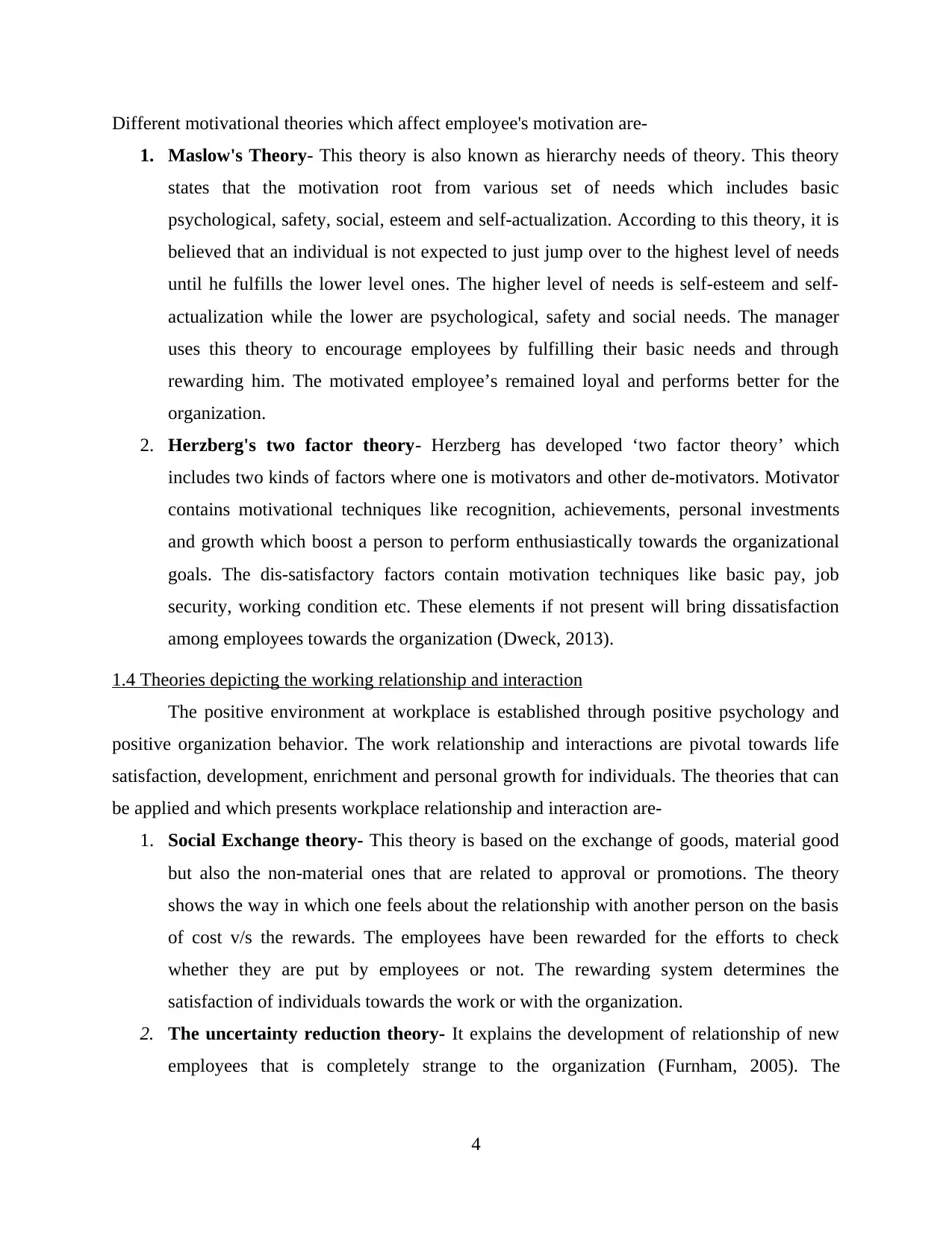
Different motivational theories which affect employee's motivation are-
1. Maslow's Theory- This theory is also known as hierarchy needs of theory. This theory
states that the motivation root from various set of needs which includes basic
psychological, safety, social, esteem and self-actualization. According to this theory, it is
believed that an individual is not expected to just jump over to the highest level of needs
until he fulfills the lower level ones. The higher level of needs is self-esteem and self-
actualization while the lower are psychological, safety and social needs. The manager
uses this theory to encourage employees by fulfilling their basic needs and through
rewarding him. The motivated employee’s remained loyal and performs better for the
organization.
2. Herzberg's two factor theory- Herzberg has developed ‘two factor theory’ which
includes two kinds of factors where one is motivators and other de-motivators. Motivator
contains motivational techniques like recognition, achievements, personal investments
and growth which boost a person to perform enthusiastically towards the organizational
goals. The dis-satisfactory factors contain motivation techniques like basic pay, job
security, working condition etc. These elements if not present will bring dissatisfaction
among employees towards the organization (Dweck, 2013).
1.4 Theories depicting the working relationship and interaction
The positive environment at workplace is established through positive psychology and
positive organization behavior. The work relationship and interactions are pivotal towards life
satisfaction, development, enrichment and personal growth for individuals. The theories that can
be applied and which presents workplace relationship and interaction are-
1. Social Exchange theory- This theory is based on the exchange of goods, material good
but also the non-material ones that are related to approval or promotions. The theory
shows the way in which one feels about the relationship with another person on the basis
of cost v/s the rewards. The employees have been rewarded for the efforts to check
whether they are put by employees or not. The rewarding system determines the
satisfaction of individuals towards the work or with the organization.
2. The uncertainty reduction theory- It explains the development of relationship of new
employees that is completely strange to the organization (Furnham, 2005). The
4
1. Maslow's Theory- This theory is also known as hierarchy needs of theory. This theory
states that the motivation root from various set of needs which includes basic
psychological, safety, social, esteem and self-actualization. According to this theory, it is
believed that an individual is not expected to just jump over to the highest level of needs
until he fulfills the lower level ones. The higher level of needs is self-esteem and self-
actualization while the lower are psychological, safety and social needs. The manager
uses this theory to encourage employees by fulfilling their basic needs and through
rewarding him. The motivated employee’s remained loyal and performs better for the
organization.
2. Herzberg's two factor theory- Herzberg has developed ‘two factor theory’ which
includes two kinds of factors where one is motivators and other de-motivators. Motivator
contains motivational techniques like recognition, achievements, personal investments
and growth which boost a person to perform enthusiastically towards the organizational
goals. The dis-satisfactory factors contain motivation techniques like basic pay, job
security, working condition etc. These elements if not present will bring dissatisfaction
among employees towards the organization (Dweck, 2013).
1.4 Theories depicting the working relationship and interaction
The positive environment at workplace is established through positive psychology and
positive organization behavior. The work relationship and interactions are pivotal towards life
satisfaction, development, enrichment and personal growth for individuals. The theories that can
be applied and which presents workplace relationship and interaction are-
1. Social Exchange theory- This theory is based on the exchange of goods, material good
but also the non-material ones that are related to approval or promotions. The theory
shows the way in which one feels about the relationship with another person on the basis
of cost v/s the rewards. The employees have been rewarded for the efforts to check
whether they are put by employees or not. The rewarding system determines the
satisfaction of individuals towards the work or with the organization.
2. The uncertainty reduction theory- It explains the development of relationship of new
employees that is completely strange to the organization (Furnham, 2005). The
4
⊘ This is a preview!⊘
Do you want full access?
Subscribe today to unlock all pages.

Trusted by 1+ million students worldwide
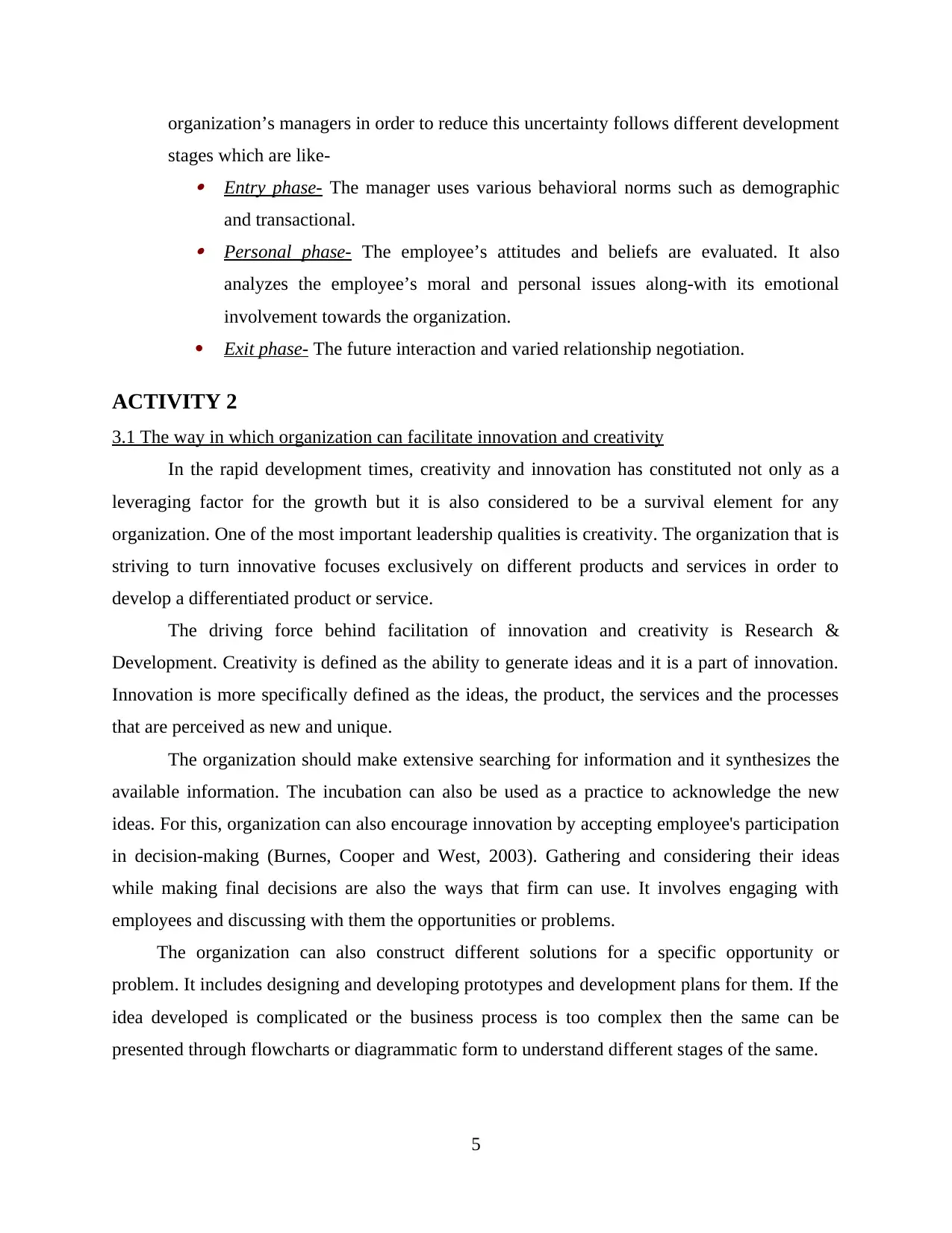
organization’s managers in order to reduce this uncertainty follows different development
stages which are like-
Entry phase- The manager uses various behavioral norms such as demographic
and transactional.
Personal phase- The employee’s attitudes and beliefs are evaluated. It also
analyzes the employee’s moral and personal issues along-with its emotional
involvement towards the organization.
Exit phase- The future interaction and varied relationship negotiation.
ACTIVITY 2
3.1 The way in which organization can facilitate innovation and creativity
In the rapid development times, creativity and innovation has constituted not only as a
leveraging factor for the growth but it is also considered to be a survival element for any
organization. One of the most important leadership qualities is creativity. The organization that is
striving to turn innovative focuses exclusively on different products and services in order to
develop a differentiated product or service.
The driving force behind facilitation of innovation and creativity is Research &
Development. Creativity is defined as the ability to generate ideas and it is a part of innovation.
Innovation is more specifically defined as the ideas, the product, the services and the processes
that are perceived as new and unique.
The organization should make extensive searching for information and it synthesizes the
available information. The incubation can also be used as a practice to acknowledge the new
ideas. For this, organization can also encourage innovation by accepting employee's participation
in decision-making (Burnes, Cooper and West, 2003). Gathering and considering their ideas
while making final decisions are also the ways that firm can use. It involves engaging with
employees and discussing with them the opportunities or problems.
The organization can also construct different solutions for a specific opportunity or
problem. It includes designing and developing prototypes and development plans for them. If the
idea developed is complicated or the business process is too complex then the same can be
presented through flowcharts or diagrammatic form to understand different stages of the same.
5
stages which are like-
Entry phase- The manager uses various behavioral norms such as demographic
and transactional.
Personal phase- The employee’s attitudes and beliefs are evaluated. It also
analyzes the employee’s moral and personal issues along-with its emotional
involvement towards the organization.
Exit phase- The future interaction and varied relationship negotiation.
ACTIVITY 2
3.1 The way in which organization can facilitate innovation and creativity
In the rapid development times, creativity and innovation has constituted not only as a
leveraging factor for the growth but it is also considered to be a survival element for any
organization. One of the most important leadership qualities is creativity. The organization that is
striving to turn innovative focuses exclusively on different products and services in order to
develop a differentiated product or service.
The driving force behind facilitation of innovation and creativity is Research &
Development. Creativity is defined as the ability to generate ideas and it is a part of innovation.
Innovation is more specifically defined as the ideas, the product, the services and the processes
that are perceived as new and unique.
The organization should make extensive searching for information and it synthesizes the
available information. The incubation can also be used as a practice to acknowledge the new
ideas. For this, organization can also encourage innovation by accepting employee's participation
in decision-making (Burnes, Cooper and West, 2003). Gathering and considering their ideas
while making final decisions are also the ways that firm can use. It involves engaging with
employees and discussing with them the opportunities or problems.
The organization can also construct different solutions for a specific opportunity or
problem. It includes designing and developing prototypes and development plans for them. If the
idea developed is complicated or the business process is too complex then the same can be
presented through flowcharts or diagrammatic form to understand different stages of the same.
5
Paraphrase This Document
Need a fresh take? Get an instant paraphrase of this document with our AI Paraphraser
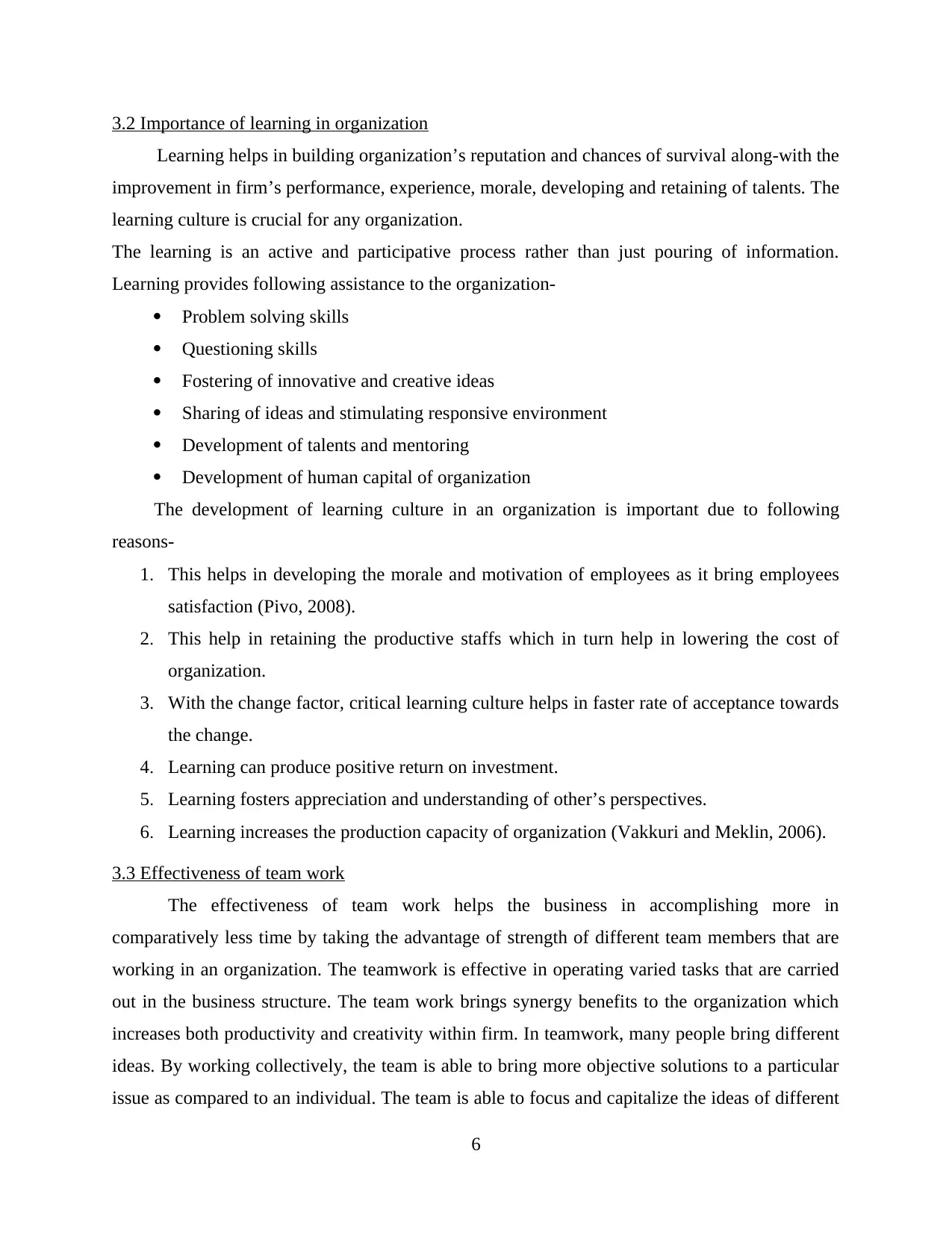
3.2 Importance of learning in organization
Learning helps in building organization’s reputation and chances of survival along-with the
improvement in firm’s performance, experience, morale, developing and retaining of talents. The
learning culture is crucial for any organization.
The learning is an active and participative process rather than just pouring of information.
Learning provides following assistance to the organization-
Problem solving skills
Questioning skills
Fostering of innovative and creative ideas
Sharing of ideas and stimulating responsive environment
Development of talents and mentoring
Development of human capital of organization
The development of learning culture in an organization is important due to following
reasons-
1. This helps in developing the morale and motivation of employees as it bring employees
satisfaction (Pivo, 2008).
2. This help in retaining the productive staffs which in turn help in lowering the cost of
organization.
3. With the change factor, critical learning culture helps in faster rate of acceptance towards
the change.
4. Learning can produce positive return on investment.
5. Learning fosters appreciation and understanding of other’s perspectives.
6. Learning increases the production capacity of organization (Vakkuri and Meklin, 2006).
3.3 Effectiveness of team work
The effectiveness of team work helps the business in accomplishing more in
comparatively less time by taking the advantage of strength of different team members that are
working in an organization. The teamwork is effective in operating varied tasks that are carried
out in the business structure. The team work brings synergy benefits to the organization which
increases both productivity and creativity within firm. In teamwork, many people bring different
ideas. By working collectively, the team is able to bring more objective solutions to a particular
issue as compared to an individual. The team is able to focus and capitalize the ideas of different
6
Learning helps in building organization’s reputation and chances of survival along-with the
improvement in firm’s performance, experience, morale, developing and retaining of talents. The
learning culture is crucial for any organization.
The learning is an active and participative process rather than just pouring of information.
Learning provides following assistance to the organization-
Problem solving skills
Questioning skills
Fostering of innovative and creative ideas
Sharing of ideas and stimulating responsive environment
Development of talents and mentoring
Development of human capital of organization
The development of learning culture in an organization is important due to following
reasons-
1. This helps in developing the morale and motivation of employees as it bring employees
satisfaction (Pivo, 2008).
2. This help in retaining the productive staffs which in turn help in lowering the cost of
organization.
3. With the change factor, critical learning culture helps in faster rate of acceptance towards
the change.
4. Learning can produce positive return on investment.
5. Learning fosters appreciation and understanding of other’s perspectives.
6. Learning increases the production capacity of organization (Vakkuri and Meklin, 2006).
3.3 Effectiveness of team work
The effectiveness of team work helps the business in accomplishing more in
comparatively less time by taking the advantage of strength of different team members that are
working in an organization. The teamwork is effective in operating varied tasks that are carried
out in the business structure. The team work brings synergy benefits to the organization which
increases both productivity and creativity within firm. In teamwork, many people bring different
ideas. By working collectively, the team is able to bring more objective solutions to a particular
issue as compared to an individual. The team is able to focus and capitalize the ideas of different
6
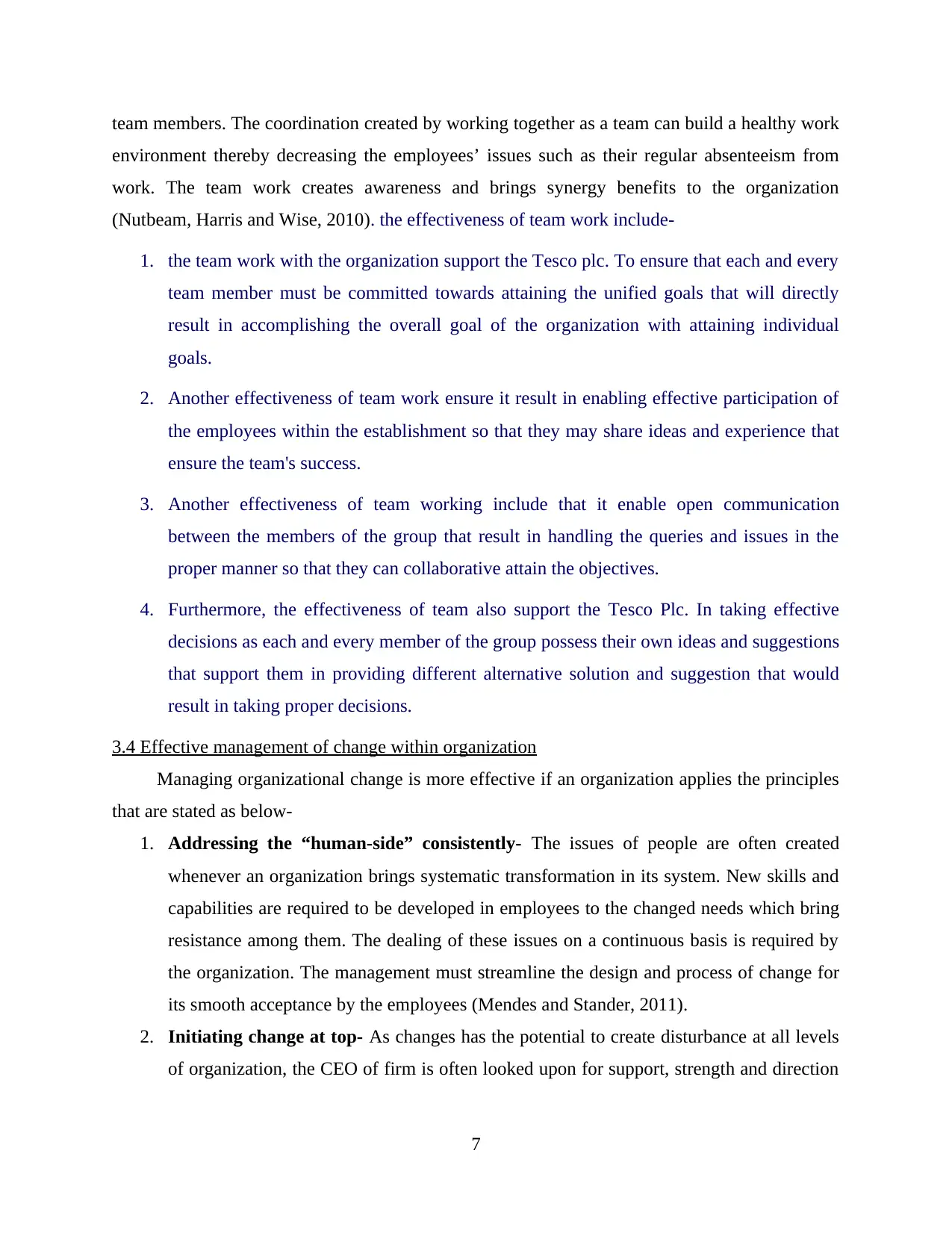
team members. The coordination created by working together as a team can build a healthy work
environment thereby decreasing the employees’ issues such as their regular absenteeism from
work. The team work creates awareness and brings synergy benefits to the organization
(Nutbeam, Harris and Wise, 2010). the effectiveness of team work include-
1. the team work with the organization support the Tesco plc. To ensure that each and every
team member must be committed towards attaining the unified goals that will directly
result in accomplishing the overall goal of the organization with attaining individual
goals.
2. Another effectiveness of team work ensure it result in enabling effective participation of
the employees within the establishment so that they may share ideas and experience that
ensure the team's success.
3. Another effectiveness of team working include that it enable open communication
between the members of the group that result in handling the queries and issues in the
proper manner so that they can collaborative attain the objectives.
4. Furthermore, the effectiveness of team also support the Tesco Plc. In taking effective
decisions as each and every member of the group possess their own ideas and suggestions
that support them in providing different alternative solution and suggestion that would
result in taking proper decisions.
3.4 Effective management of change within organization
Managing organizational change is more effective if an organization applies the principles
that are stated as below-
1. Addressing the “human-side” consistently- The issues of people are often created
whenever an organization brings systematic transformation in its system. New skills and
capabilities are required to be developed in employees to the changed needs which bring
resistance among them. The dealing of these issues on a continuous basis is required by
the organization. The management must streamline the design and process of change for
its smooth acceptance by the employees (Mendes and Stander, 2011).
2. Initiating change at top- As changes has the potential to create disturbance at all levels
of organization, the CEO of firm is often looked upon for support, strength and direction
7
environment thereby decreasing the employees’ issues such as their regular absenteeism from
work. The team work creates awareness and brings synergy benefits to the organization
(Nutbeam, Harris and Wise, 2010). the effectiveness of team work include-
1. the team work with the organization support the Tesco plc. To ensure that each and every
team member must be committed towards attaining the unified goals that will directly
result in accomplishing the overall goal of the organization with attaining individual
goals.
2. Another effectiveness of team work ensure it result in enabling effective participation of
the employees within the establishment so that they may share ideas and experience that
ensure the team's success.
3. Another effectiveness of team working include that it enable open communication
between the members of the group that result in handling the queries and issues in the
proper manner so that they can collaborative attain the objectives.
4. Furthermore, the effectiveness of team also support the Tesco Plc. In taking effective
decisions as each and every member of the group possess their own ideas and suggestions
that support them in providing different alternative solution and suggestion that would
result in taking proper decisions.
3.4 Effective management of change within organization
Managing organizational change is more effective if an organization applies the principles
that are stated as below-
1. Addressing the “human-side” consistently- The issues of people are often created
whenever an organization brings systematic transformation in its system. New skills and
capabilities are required to be developed in employees to the changed needs which bring
resistance among them. The dealing of these issues on a continuous basis is required by
the organization. The management must streamline the design and process of change for
its smooth acceptance by the employees (Mendes and Stander, 2011).
2. Initiating change at top- As changes has the potential to create disturbance at all levels
of organization, the CEO of firm is often looked upon for support, strength and direction
7
⊘ This is a preview!⊘
Do you want full access?
Subscribe today to unlock all pages.

Trusted by 1+ million students worldwide
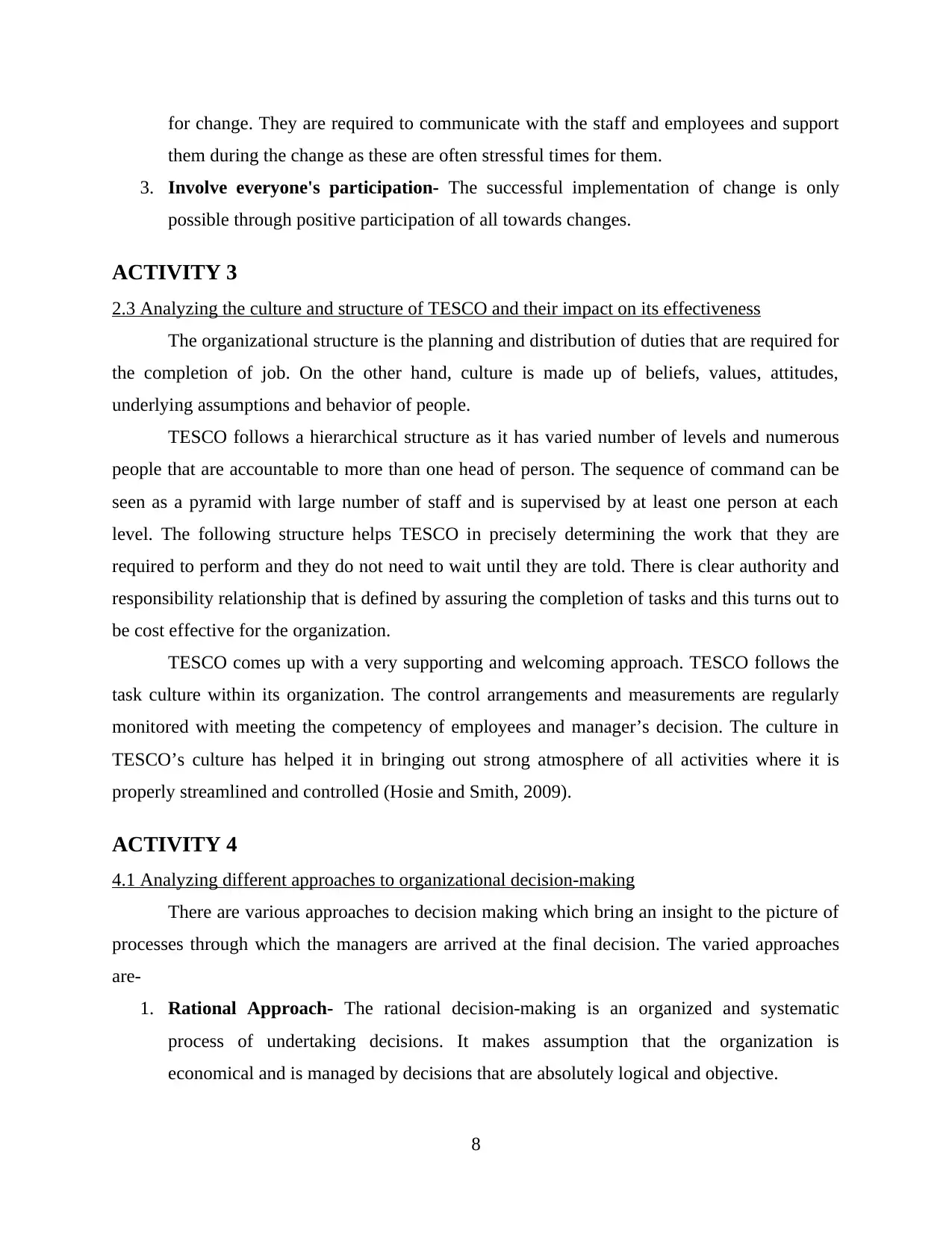
for change. They are required to communicate with the staff and employees and support
them during the change as these are often stressful times for them.
3. Involve everyone's participation- The successful implementation of change is only
possible through positive participation of all towards changes.
ACTIVITY 3
2.3 Analyzing the culture and structure of TESCO and their impact on its effectiveness
The organizational structure is the planning and distribution of duties that are required for
the completion of job. On the other hand, culture is made up of beliefs, values, attitudes,
underlying assumptions and behavior of people.
TESCO follows a hierarchical structure as it has varied number of levels and numerous
people that are accountable to more than one head of person. The sequence of command can be
seen as a pyramid with large number of staff and is supervised by at least one person at each
level. The following structure helps TESCO in precisely determining the work that they are
required to perform and they do not need to wait until they are told. There is clear authority and
responsibility relationship that is defined by assuring the completion of tasks and this turns out to
be cost effective for the organization.
TESCO comes up with a very supporting and welcoming approach. TESCO follows the
task culture within its organization. The control arrangements and measurements are regularly
monitored with meeting the competency of employees and manager’s decision. The culture in
TESCO’s culture has helped it in bringing out strong atmosphere of all activities where it is
properly streamlined and controlled (Hosie and Smith, 2009).
ACTIVITY 4
4.1 Analyzing different approaches to organizational decision-making
There are various approaches to decision making which bring an insight to the picture of
processes through which the managers are arrived at the final decision. The varied approaches
are-
1. Rational Approach- The rational decision-making is an organized and systematic
process of undertaking decisions. It makes assumption that the organization is
economical and is managed by decisions that are absolutely logical and objective.
8
them during the change as these are often stressful times for them.
3. Involve everyone's participation- The successful implementation of change is only
possible through positive participation of all towards changes.
ACTIVITY 3
2.3 Analyzing the culture and structure of TESCO and their impact on its effectiveness
The organizational structure is the planning and distribution of duties that are required for
the completion of job. On the other hand, culture is made up of beliefs, values, attitudes,
underlying assumptions and behavior of people.
TESCO follows a hierarchical structure as it has varied number of levels and numerous
people that are accountable to more than one head of person. The sequence of command can be
seen as a pyramid with large number of staff and is supervised by at least one person at each
level. The following structure helps TESCO in precisely determining the work that they are
required to perform and they do not need to wait until they are told. There is clear authority and
responsibility relationship that is defined by assuring the completion of tasks and this turns out to
be cost effective for the organization.
TESCO comes up with a very supporting and welcoming approach. TESCO follows the
task culture within its organization. The control arrangements and measurements are regularly
monitored with meeting the competency of employees and manager’s decision. The culture in
TESCO’s culture has helped it in bringing out strong atmosphere of all activities where it is
properly streamlined and controlled (Hosie and Smith, 2009).
ACTIVITY 4
4.1 Analyzing different approaches to organizational decision-making
There are various approaches to decision making which bring an insight to the picture of
processes through which the managers are arrived at the final decision. The varied approaches
are-
1. Rational Approach- The rational decision-making is an organized and systematic
process of undertaking decisions. It makes assumption that the organization is
economical and is managed by decisions that are absolutely logical and objective.
8
Paraphrase This Document
Need a fresh take? Get an instant paraphrase of this document with our AI Paraphraser
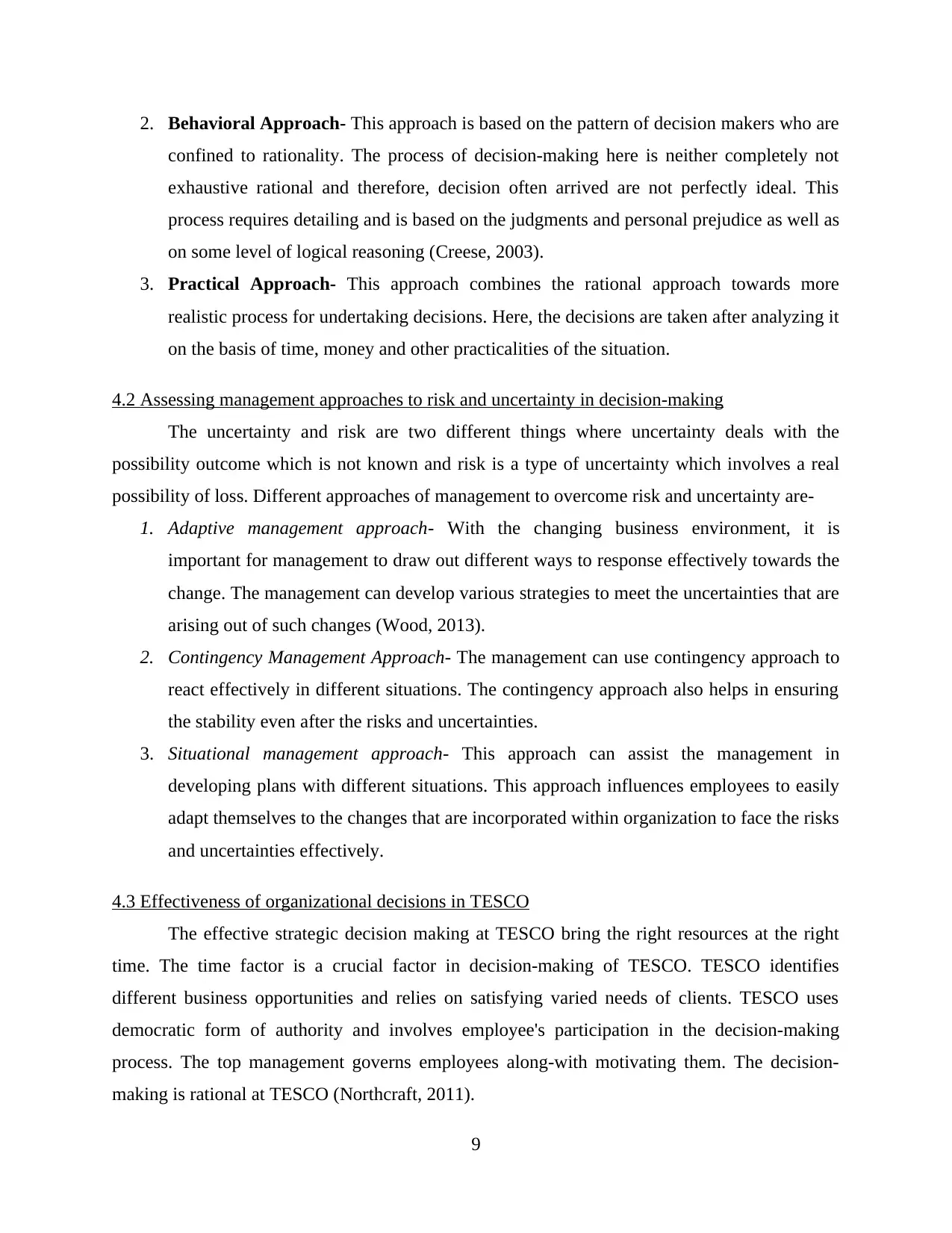
2. Behavioral Approach- This approach is based on the pattern of decision makers who are
confined to rationality. The process of decision-making here is neither completely not
exhaustive rational and therefore, decision often arrived are not perfectly ideal. This
process requires detailing and is based on the judgments and personal prejudice as well as
on some level of logical reasoning (Creese, 2003).
3. Practical Approach- This approach combines the rational approach towards more
realistic process for undertaking decisions. Here, the decisions are taken after analyzing it
on the basis of time, money and other practicalities of the situation.
4.2 Assessing management approaches to risk and uncertainty in decision-making
The uncertainty and risk are two different things where uncertainty deals with the
possibility outcome which is not known and risk is a type of uncertainty which involves a real
possibility of loss. Different approaches of management to overcome risk and uncertainty are-
1. Adaptive management approach- With the changing business environment, it is
important for management to draw out different ways to response effectively towards the
change. The management can develop various strategies to meet the uncertainties that are
arising out of such changes (Wood, 2013).
2. Contingency Management Approach- The management can use contingency approach to
react effectively in different situations. The contingency approach also helps in ensuring
the stability even after the risks and uncertainties.
3. Situational management approach- This approach can assist the management in
developing plans with different situations. This approach influences employees to easily
adapt themselves to the changes that are incorporated within organization to face the risks
and uncertainties effectively.
4.3 Effectiveness of organizational decisions in TESCO
The effective strategic decision making at TESCO bring the right resources at the right
time. The time factor is a crucial factor in decision-making of TESCO. TESCO identifies
different business opportunities and relies on satisfying varied needs of clients. TESCO uses
democratic form of authority and involves employee's participation in the decision-making
process. The top management governs employees along-with motivating them. The decision-
making is rational at TESCO (Northcraft, 2011).
9
confined to rationality. The process of decision-making here is neither completely not
exhaustive rational and therefore, decision often arrived are not perfectly ideal. This
process requires detailing and is based on the judgments and personal prejudice as well as
on some level of logical reasoning (Creese, 2003).
3. Practical Approach- This approach combines the rational approach towards more
realistic process for undertaking decisions. Here, the decisions are taken after analyzing it
on the basis of time, money and other practicalities of the situation.
4.2 Assessing management approaches to risk and uncertainty in decision-making
The uncertainty and risk are two different things where uncertainty deals with the
possibility outcome which is not known and risk is a type of uncertainty which involves a real
possibility of loss. Different approaches of management to overcome risk and uncertainty are-
1. Adaptive management approach- With the changing business environment, it is
important for management to draw out different ways to response effectively towards the
change. The management can develop various strategies to meet the uncertainties that are
arising out of such changes (Wood, 2013).
2. Contingency Management Approach- The management can use contingency approach to
react effectively in different situations. The contingency approach also helps in ensuring
the stability even after the risks and uncertainties.
3. Situational management approach- This approach can assist the management in
developing plans with different situations. This approach influences employees to easily
adapt themselves to the changes that are incorporated within organization to face the risks
and uncertainties effectively.
4.3 Effectiveness of organizational decisions in TESCO
The effective strategic decision making at TESCO bring the right resources at the right
time. The time factor is a crucial factor in decision-making of TESCO. TESCO identifies
different business opportunities and relies on satisfying varied needs of clients. TESCO uses
democratic form of authority and involves employee's participation in the decision-making
process. The top management governs employees along-with motivating them. The decision-
making is rational at TESCO (Northcraft, 2011).
9
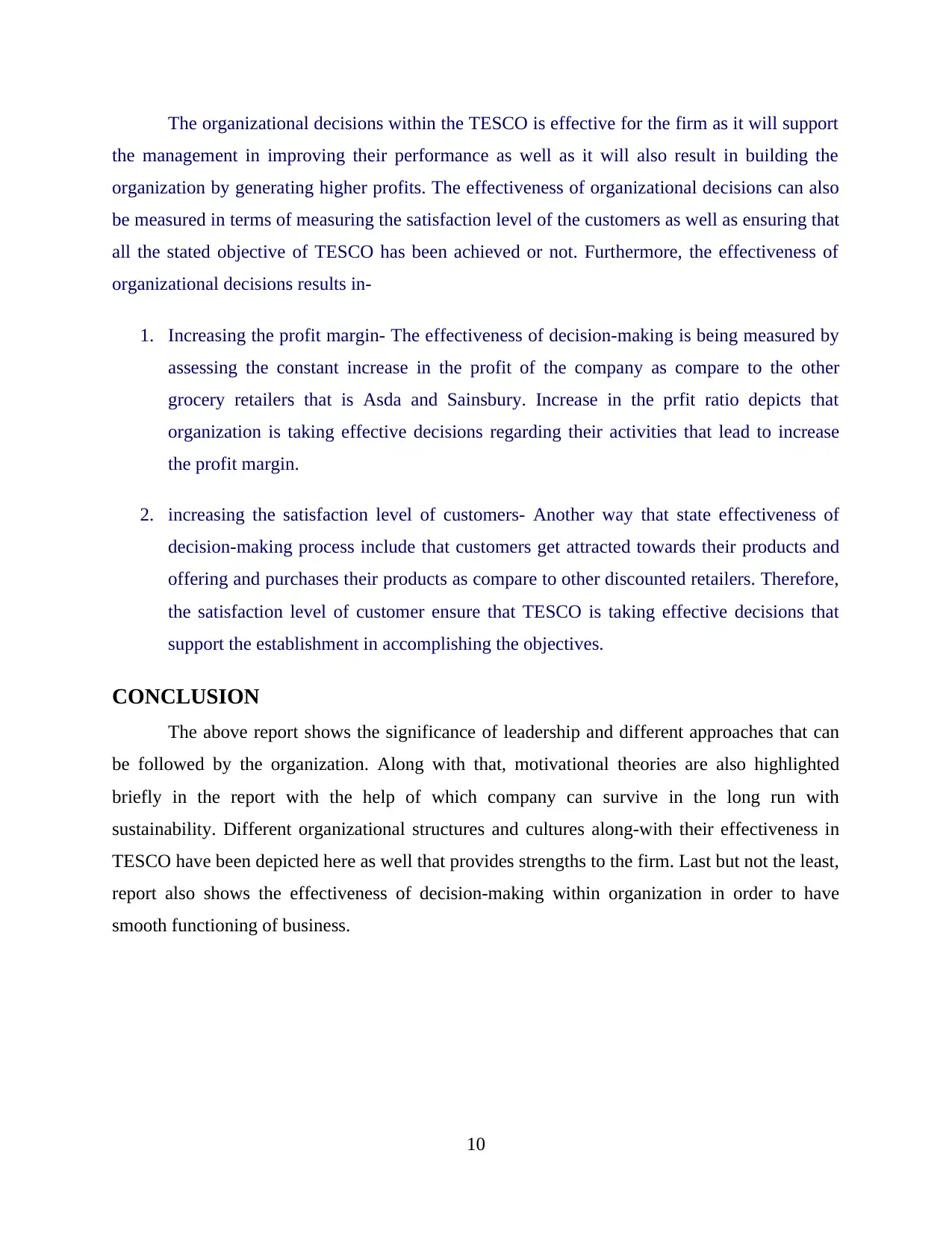
The organizational decisions within the TESCO is effective for the firm as it will support
the management in improving their performance as well as it will also result in building the
organization by generating higher profits. The effectiveness of organizational decisions can also
be measured in terms of measuring the satisfaction level of the customers as well as ensuring that
all the stated objective of TESCO has been achieved or not. Furthermore, the effectiveness of
organizational decisions results in-
1. Increasing the profit margin- The effectiveness of decision-making is being measured by
assessing the constant increase in the profit of the company as compare to the other
grocery retailers that is Asda and Sainsbury. Increase in the prfit ratio depicts that
organization is taking effective decisions regarding their activities that lead to increase
the profit margin.
2. increasing the satisfaction level of customers- Another way that state effectiveness of
decision-making process include that customers get attracted towards their products and
offering and purchases their products as compare to other discounted retailers. Therefore,
the satisfaction level of customer ensure that TESCO is taking effective decisions that
support the establishment in accomplishing the objectives.
CONCLUSION
The above report shows the significance of leadership and different approaches that can
be followed by the organization. Along with that, motivational theories are also highlighted
briefly in the report with the help of which company can survive in the long run with
sustainability. Different organizational structures and cultures along-with their effectiveness in
TESCO have been depicted here as well that provides strengths to the firm. Last but not the least,
report also shows the effectiveness of decision-making within organization in order to have
smooth functioning of business.
10
the management in improving their performance as well as it will also result in building the
organization by generating higher profits. The effectiveness of organizational decisions can also
be measured in terms of measuring the satisfaction level of the customers as well as ensuring that
all the stated objective of TESCO has been achieved or not. Furthermore, the effectiveness of
organizational decisions results in-
1. Increasing the profit margin- The effectiveness of decision-making is being measured by
assessing the constant increase in the profit of the company as compare to the other
grocery retailers that is Asda and Sainsbury. Increase in the prfit ratio depicts that
organization is taking effective decisions regarding their activities that lead to increase
the profit margin.
2. increasing the satisfaction level of customers- Another way that state effectiveness of
decision-making process include that customers get attracted towards their products and
offering and purchases their products as compare to other discounted retailers. Therefore,
the satisfaction level of customer ensure that TESCO is taking effective decisions that
support the establishment in accomplishing the objectives.
CONCLUSION
The above report shows the significance of leadership and different approaches that can
be followed by the organization. Along with that, motivational theories are also highlighted
briefly in the report with the help of which company can survive in the long run with
sustainability. Different organizational structures and cultures along-with their effectiveness in
TESCO have been depicted here as well that provides strengths to the firm. Last but not the least,
report also shows the effectiveness of decision-making within organization in order to have
smooth functioning of business.
10
⊘ This is a preview!⊘
Do you want full access?
Subscribe today to unlock all pages.

Trusted by 1+ million students worldwide
1 out of 14
Related Documents
Your All-in-One AI-Powered Toolkit for Academic Success.
+13062052269
info@desklib.com
Available 24*7 on WhatsApp / Email
![[object Object]](/_next/static/media/star-bottom.7253800d.svg)
Unlock your academic potential
Copyright © 2020–2026 A2Z Services. All Rights Reserved. Developed and managed by ZUCOL.





